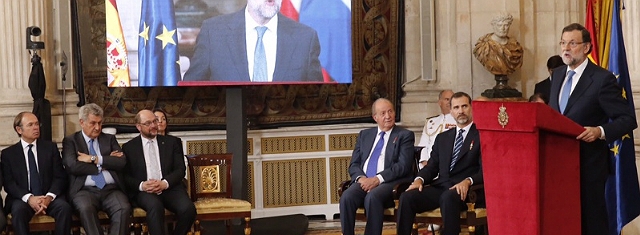Politics
Neither Spain is without Europe nor the European ideal is complete without Spain
Mariano Rajoy speech

Speech of Mariano Rajoy (Source: Pool)
According to Rajoy, "adherence was above all the expression of a shared desire by all Spaniards." During his speech, Mariano Rajoy stressed that the accession of Spain to the European Communities "was the achievement of the dream-European modernity that had claimed our best thinkers". The Prime Minister said that "neither Spain is without Europe nor the European ideal is complete without Spain." He admitted that during these years, "our country has made progress in all areas largely through participation in European integration" but said also "Spain has contributed much to the Union," both in good times and calm and crisis and storm.
Rajoy, speaking of the economic crisis, said that "Europe was able to take decisions quickly enormous depth," as were the creation of financial instruments to ensure the stability, deepening of Economic and Monetary Union and measures European Central Bank liquidity. Meanwhile, he said, Spain "promoted a program of structural reforms in all fields, he proceeded to reorganization of its public accounts and carried out a restructuring of its financial sector with European help."
According to Rajoy, the Spanish European solidarity and responsibility have made Spain "the best reference that the European strategy for overcoming the crisis is working." Although much remains to be done, he said, Spain is now Europe's fastest growing economy can achieve in the next legislature the 20 million jobs. The Prime Minister also addressed the future of the EU. In his view, the main concern of European citizens is job creation and the preservation of the social dimension. To achieve these two objectives, it is necessary to boost growth, increase investment and promote reforms that promote competitiveness.
In this sense, Rajoy listed some of the specific challenges of the EU in the future: the Plan Juncker, the Transatlantic Partnership Agreement with the United States or the Youth Guarantee Plan. To this we must add, he said, the creation of a Union of Energy to achieve "affordable, safe and sustainable" energy and the development of a union of freedom, security and justice with a truly European migration policy. In all these chapters, the Prime Minister said that "Spain has ideas and initiatives" that will enrich the process. At this point he cited the proposal to improve the governance of the euro area, develop a specific budget for the eurozone and create a common debt agency.
Furthermore, Spain also promotes "global political action oriented development cooperation and act on the causes of migration". According to Rajoy, we want "a Europe of solidarity, with clear rules, a common house freedoms and obligations; a continent with common to all borders and defended by all, a competitive Europe in a world that waits for no one; and Europe, sustainable for future generations" social soul.
In the words of Prime Minister, "Spain brings something very important for the future of the Union": the strong commitment of the Spanish "who are proud to be part of the European family and we demand more and better Europe." At the end of his speech, the chief executive said that "Spain is a great country" to which the output of the economic crisis should serve as a "stimulus to face the future with hope." Mariano Rajoy had words of remembrance and thanks to Jacques Delors, former President of the European Commission when there was the Spanish integration. According to Rajoy, request, along with the President of France, the European Council granted him the title of Honorary Citizen of Europe.
Liability for this article lies with the author, who also holds the copyright. Editorial content from USPA may be quoted on other websites as long as the quote comprises no more than 5% of the entire text, is marked as such and the source is named (via hyperlink).







